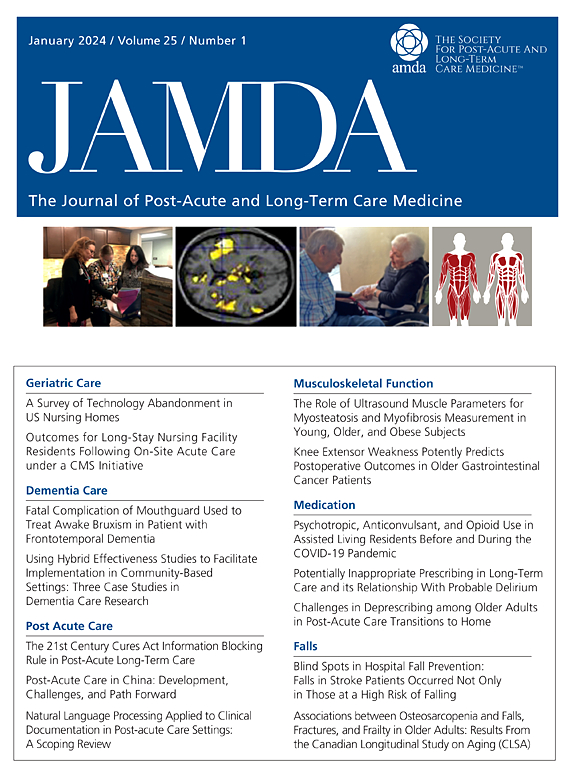中国老年人电子健康素养与健康相关生活质量的三阶段纵向研究:一般自我效能感的中介作用》。
IF 4.2
2区 医学
Q2 GERIATRICS & GERONTOLOGY
Journal of the American Medical Directors Association
Pub Date : 2024-10-16
DOI:10.1016/j.jamda.2024.105310
引用次数: 0
摘要
背景和目的:与健康相关的生活质量(HRQoL)是反映老年人晚年生活独立性和幸福感的重要指标。提高老年人的 HRQoL 对实现健康老龄化具有重要意义。互联网提供了广泛的健康信息,能够有效使用电子健康(eHealth)资源(体现为 "电子健康素养")可能会增强老年人管理健康和改善 HRQoL 的能力。然而,关于这一人群的电子健康素养与 HRQoL 之间关系的证据却很有限。本研究旨在研究老年人的电子健康素养与 HRQoL 之间的纵向关联和时间关系,并探索潜在的内在机制:设计:一项三波纵向研究:环境和参与者:中国江西省 55 岁及以上的中国老年人:方法:在2022年2月至12月期间,使用在线自我报告问卷收集基线(T1)、3个月(T2)和6个月(T3)随访数据。统计分析包括纵向托比特回归、跨滞后面板模型(CLPM)和纵向中介分析:结果:共有 611 名参与者参加了第一阶段的研究,其中 464 人(75.9%)完成了 3 个月和 6 个月的随访。纵向托比特回归表明,在考虑了协变量后,随着时间的推移,具有较高电子健康素养的老年人显示出更好的 HRQoL(调整后的β,0.023;95% CI,0.011-0.035;P < .001)。CLPM证实,较高的电子健康素养可显著预测随着时间的推移HRQoL的改善(标准化β,0.09,P = .008),但反之亦然。此外,T2时的一般自我效能感完全介导了T1时的电子健康素养与T3时的HRQoL之间的关系,介导比例为28.3%:本研究强调了电子健康素养和自我效能感在改善老年人 HRQoL 方面的重要性,有助于制定有针对性的干预措施来提高老年人的 HRQoL。本文章由计算机程序翻译,如有差异,请以英文原文为准。
A 3-Wave Longitudinal Study of eHealth Literacy and Older People's Health-Related Quality of Life in China: The Mediating Role of General Self-Efficacy
Background and Objectives
Health-related quality of life (HRQoL) is an important indicator to reflect the independence and well-being of older adults in their later life. Improving the HRQoL of older adults is of great importance for achieving healthy aging. The internet provides extensive health information and being able to effectively use the electronic health (eHealth) resources (reflected as “eHealth literacy”) potentially empowers older adults to manage health and improve HRQoL. However, there is limited evidence about the relationship between eHealth literacy and HRQoL in this population. This study aims to examine the longitudinal association and temporal relationship between eHealth literacy and HRQoL among older adults, and to explore potential underlying mechanisms.
Design
A 3-wave longitudinal study.
Setting and Participants
Chinese older adults aged 55 or older in Jiangxi Province, China.
Methods
Data were collected at baseline (T1) and 3-month (T2) and 6-month (T3) follow-ups during February to December 2022, using online self-reported questionnaires. eHealth literacy, HRQoL, and general self-efficacy were measured using validated tools. Statistical analyses, including longitudinal Tobit regression, cross-lagged panel model (CLPM), and longitudinal mediation analysis were performed.
Results
A total of 611 participants were included at T1, and 464 (75.9%) completed both 3- and 6-month follow-ups. Longitudinal Tobit regression suggested that older individuals with higher eHealth literacy showed better HRQoL over time (adjusted β, 0.023; 95% CI, 0.011–0.035; P < .001), after accounting for covariates. The CLPM supported that higher eHealth literacy significantly predicts improved HRQoL over time (standardized β, 0.09, P = .008), but not the reverse. In addition, general self-efficacy at T2 fully mediated the relationship from eHealth literacy at T1 and HRQoL at T3, with mediated proportion of 28.3%.
Conclusions and Implications
This study highlighted the importance of eHealth literacy and self-efficacy in improving HRQoL among older adults, supporting the development of tailored interventions to promote their HRQoL.
求助全文
通过发布文献求助,成功后即可免费获取论文全文。
去求助
来源期刊
CiteScore
11.10
自引率
6.60%
发文量
472
审稿时长
44 days
期刊介绍:
JAMDA, the official journal of AMDA - The Society for Post-Acute and Long-Term Care Medicine, is a leading peer-reviewed publication that offers practical information and research geared towards healthcare professionals in the post-acute and long-term care fields. It is also a valuable resource for policy-makers, organizational leaders, educators, and advocates.
The journal provides essential information for various healthcare professionals such as medical directors, attending physicians, nurses, consultant pharmacists, geriatric psychiatrists, nurse practitioners, physician assistants, physical and occupational therapists, social workers, and others involved in providing, overseeing, and promoting quality

 求助内容:
求助内容: 应助结果提醒方式:
应助结果提醒方式:


